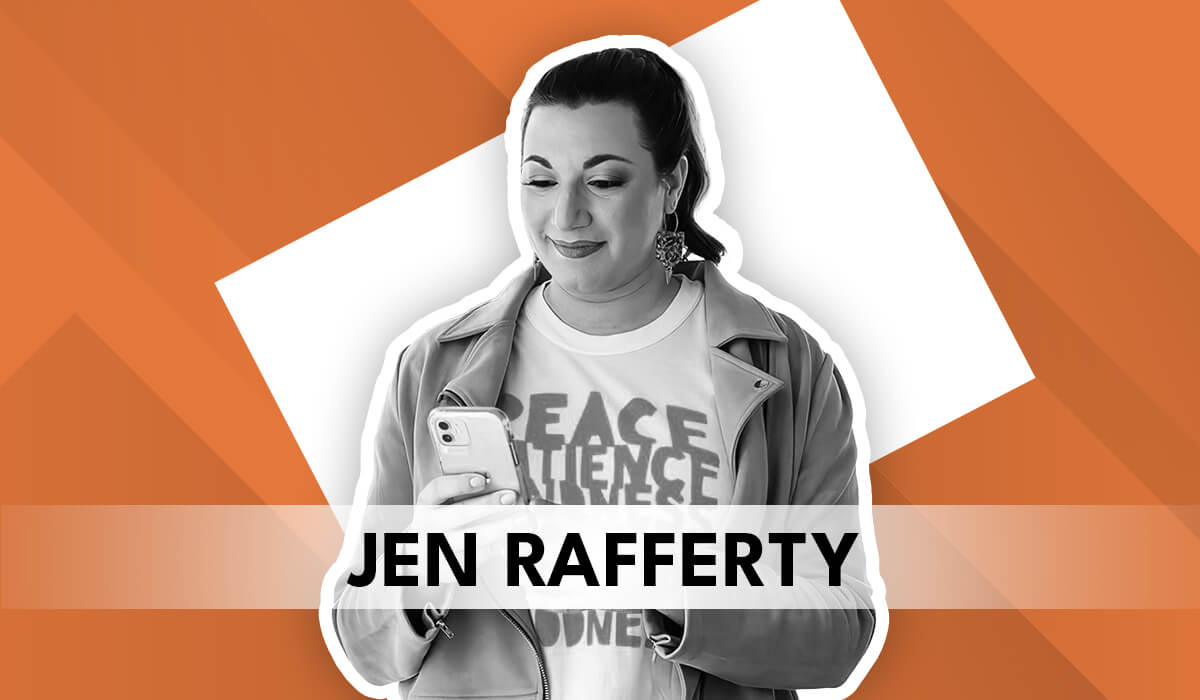
"When we believe in ourselves as teachers, it shows students they matter too."
Jen Rafferty Tweet
Educator, author, and international public speaker, Jen Rafferty started as a middle school music teacher for 15 years in Central New York. Jen is a certified Emotional Intelligence Practitioner and is currently pursuing her Ph.D. in Educational Psychology.
As the CEO of Empowered Educator, Jen’s insatiable curiosity continues to make the Empowered Educator programs relevant and reflective of the most up-to-date research in mindset, leadership, and cognitive neuroscience. She is committed to inspiring teachers and school leaders to discover their voice and maintain a healthy longevity throughout their careers.
Name: Jen Rafferty
Company: Empowered Educator
Check out more interviews with entrepreneurs here.
Table of Contents
Jen — You are the CEO of Empowered Educator, a research-based transformational program that prioritizes the social/emotional health of our educators to achieve systemic, long-term success for the entire school community. What prompted you to launch Empowered Educator?
Jen Rafferty: Since I was a kid, I always wanted to be a music teacher and it really felt more like a calling instead of a choice. I loved music, particularly singing, and wanted to inspire others to discover their voice.
I taught middle school choir for 15 years in the public schools. It was a lot of fun, and it felt important to provide students with a safe space to express themselves and be creative. Eventually, I started conducting honors choirs across New York State, presenting at national conferences, and published a book.
But, during the Covid pandemic we couldn’t ignore the stress that teachers were facing. It wasn’t new to experience stress as a teacher, but Covid highlighted how bad it really was.
There was a large gap between what teachers needed and the support they were getting and I wanted to build a bridge. I truly believe that the well-being of a school is dependent on the well-being of its educators, so I wanted to help take care of the people who take care of our kids.
I decided to take off a semester (or so I thought) during the fall of 2020 to homeschool my own children. During that time I started my Ph.D. in Educational Psychology, and dove into the research of mindset, emotional intelligence and cognitive neuroscience. I even got a certification as an emotional intelligence practitioner.
When it came time to decide whether or not I should go back to teaching, I decided to take a leap and build my company, Empowered Educator, which focuses on the social and emotional needs of the adults in schools.
Educators are with their students, modeling for them, each day. How do you believe it impacts the students and overall school environment to see teachers regulated and taking care of themselves?
Jen Rafferty: Our students look to the adults in their lives to learn how to be a human. When they see us living in perpetual stress, overwhelm, and depletion, we are normalizing burnout for them. We need to learn how to manage our emotions and regulate ourselves in ways that are healthy, safe, and productive so our students can learn from our example.
This is really the foundation of what we believe at Empowered Educator: the most generous thing we can do for our students is take care of ourselves. We can’t leapfrog over the adults and only focus on the kids. The adults are very much a part of the equation because we create the environment for our kids to learn.
Just like we can’t teach Spanish if we don’t have a solid foundation of the language, we can’t teach social/emotional learning skills if we are not embodying these lessons ourselves.

Can you talk a little bit about what happens when we don’t address the feelings of dysregulation?
Jen Rafferty: It’s so common to feel the need to “keep it together” and “grin and bear it” when we start to feel burnout, (or any sort of uncomfortable feelings). But unless we acknowledge and validate our feelings and dysregulation, they end up being suppressed.
Time ticks by and these suppressed feelings (that have now piled up over years and years of “soldiering on”) can begin to manifest themselves as back pain, anxiety, depression and other illnesses. As a result, productivity goes down and overall happiness decreases dramatically and you’re left feeling confused as to how you got here in the first place.
Nobody can become a healthy and productive member of society from a place of exhaustion, pressure, and overwhelm. Just because it’s common, doesn’t mean it’s normal. We can want more for ourselves. I hope we want more for our students.
In your TEDx Speech that went viral on Instagram, you remind us that although teachers are wonderful people with incredibly big hearts, they are not superheroes. You have said this narrative is dangerous. Where do you believe this narrative originated from?
Jen Rafferty: Teachers are often referred to as superheroes. While this sounds like a good thing, it can be a dangerous narrative. Teachers are heroes, yes; and they are very much human. When we compare teachers to these immortal and indestructible superheroes, we create a story that perpetuates the idea that needing anything is selfish.
So as not to be seen as selfish, teachers often struggle with taking a much-needed sick day, asking for help and support, or even prioritizing a bathroom break. This is not sustainable, and it is certainly not the type of modeling we want for our students. As I mentioned before, the most generous thing you can do for your students is take care of yourself.
If we want our students to know their self-worth, then we need to know ours. I think this message went viral because we don’t often talk about it openly in this way.
What can organizations do to support their employees if they are feeling burnout?
Jen Rafferty: Organizations don’t change until people change. I think that everyone can help their feelings of burnout by increasing their own emotional intelligence. Creating safe spaces for people to express themselves doesn’t just happen because you put up a sign that says “safe space”.
In order to create a healthy environment, we need to spend time to improve our self-awareness, self-management, social awareness and relationship management. These skills don’t happen automatically. They need practice, patience, persistence and support.
Your role as a CEO hzas to be incredibly challenging at times. How do you prioritize your own health and wellness so you remain in optimal mental, physical, emotional, and spiritual condition?
Jen Rafferty: I truly practice everything I teach, and I believe the impact of my company is directly related to my own health and wellness. So the biggest shift for me has been in the way I define success. I used to think success was determined by external factors: how much money was in my bank account, how many hours I worked, or when I was a student, how many A’s and awards I earned.
But with success constantly being external, I was always chasing it. And when success is external, even if we get it, we’re back chasing again because we aren’t actually chasing the thing, we’re chasing the feeling.
Now I define success as feeling the way I want to feel for as many hours of the day as possible.This informs the way I structure my day, interact with clients, and how I spend my time. It keeps me focused on my priorities which always come down to my own self-regulation and choosing actions that align with feeling the way I want to feel.
How can Educators, Parents, and other interested Parties learn more about you and your work? Do you have any upcoming courses or programs?
Jen Rafferty: Yes! I am so excited about THRIVE. This course will give you concrete strategies to sustainably put on your own oxygen mask first. If you’re constantly feeling stress, exhaustion and frustration and as if just have to push through each day, it’s important to ask yourself, “how are you showing up for your students and the other people in your life?”
It’s time to do things differently because nothing changes if nothing changes. THRIVE will guide you through renewing a connection with your role as an education, creating clear and confident goals, and the tools to feel peace and calm throughout your day.
THRIVE also comes an opportunity to join a large community of other Empowered Educators who are thriving and 3 live group coaching sessions with me! You can learn more about THRIVE and other Empowered Educator programs at www.empowerededucator.com/workshops.
Jerome Knyszewski, VIP Contributor to WellnessVoice and the host of this interview would like to thank Jen Rafferty for taking the time to do this interview and share her knowledge and experience with our readers.
If you would like to get in touch with Jen Rafferty or her company, you can do it through her – Linkedin Page
Did you enjoy this article? Check out similar stories:
Iona Holloway of Soul Breathwork Shares Strategies for Workplace Well-being
Insights from Jodi Brandstetter of Influence Network Media
Ariadne Wolf of Mermaid Consulting Shares Strategies for Empowering Employees
A Conversation with Foram Sheth of Ama La Vida
Alla Weinberg of Spoke & Wheel Dives into Workplace Mental Health Support
Disclaimer: The WellnessVoice Community welcomes voices from many spheres on our open platform. We publish pieces as written by outside contributors with a wide range of opinions, which don’t necessarily reflect our own. Community stories are not commissioned by our editorial team and must meet our guidelines prior to being published.
